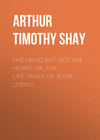Читать книгу: «Off-Hand Sketches, a Little Dashed with Humor», страница 7
"As you please," said Jenkins angrily, turning away, and entering his house.
Before twelve o'clock on the next day, however, Jenkins's clerk called in at the store of Gooding, and paid him four hundred and twenty-six dollars, for which he took his receipt in full for all demands to date. The two men were never afterward on terms of sufficient intimacy to ride in the same wagon together. Whether Gooding and his clerk kept the matter a secret, as they promised, we don't know. It is very certain, that it was known all over town in less than a week, and soon after was told in the newspapers, as a most capital joke.
A SHOCKING BAD MEMORY
"MUST I give up every thing?" asked Mr. Hardy of his lawyer, with whom he was holding a consultation as to the mode and manner of getting clear of certain responsibilities in the shape of debt.
"Yes, every thing, or commit perjury. The oath you have taken is very comprehensive. If you keep back as much as ten dollars, you will swear falsely."
"Bad—bad. I have about seven thousand dollars, and I owe twenty thousand. To divide this among my creditors, gives them but a small sum apiece, while it strips me of every thing. Is there no way, Mr. Dockett, by which I can retain this money, and yet not take a false oath? You gentlemen of the bar can usually find some loop-hole in the law out of which to help your clients. I know of several who have gone through the debtors' mill, and yet not come forth penniless; and some of them, I know, would not be guilty of false swearing."
"Oh yes, the thing is done every day."
"Ah, well, how is it done?"
"The process is very simple. Take your seven thousand dollars, and make it a present to some friend, in whom you can confide. Then you will be worth nothing, and go before the insolvent commissioners and swear until you are black and blue, without perjuring yourself."
"Humph! is that the way it is done?" said Mr. Hardy.
"The very way."
"But suppose the friend should decline handing it back?"
The lawyer shrugged his shoulders as he replied, "You must take care whom you trust in an affair of this kind. At worst, however, you would be just as well off, assuming that your friend should hold on to what you gave him, as you would be if you abandoned all to your creditors."
"True, if I abandon all, there is no hope of, even getting back a dollar. It is the same as if I had thrown every thing into the sea."
"Precisely."
"While, in adopting the plan you propose, the chances for getting back my own again are eight to ten in my favour."
"Or, you might almost say, ten to ten. No friend into whose hands you confided the little remnant of your property would be so base as to withhold it from you."
"I will do it," said Mr. Hardy, as he parted with the lawyer.
One day, a few weeks after this interview took place, the client of Mr. Dockett came hurriedly into his office, and, drawing him aside, said, as he slipped a small package into his hand, "Here is something for you. You remember our conversation a short time ago?"
"Oh, very well."
"You understand me, Mr. Dockett?"
"Oh, perfectly! all right; when do you go before the commissioners?"
"To-morrow."
"Ah?"
"Yes—good morning. I will see you again as soon as all is over."
"Very well—good morning."
On the next day, Mr. Hardy met before the commissioners, and took a solemn oath that he had truly and honestly given up into the hands of his assignee every dollar of his property, for the benefit of his creditors, and that he did not now possess any thing beyond what the law permitted him to retain. Upon this, the insolvent commissioners gave him a full release from the claims that were held against him, and Mr. Hardy was able to say, as far as the law was concerned, "I owe no man any thing."
Mr. Dockett, the lawyer, was sitting in his office on the day after his client had shuffled off his coil of debt, his mind intent upon some legal mystery, when the latter individual came in with a light step and cheerful air.
"Good morning, Mr. Hardy," said the lawyer, smiling blandly.
"Good morning," returned the client.
"How are things progressing?" inquired the lawyer.
"All right," returned Hardy, rubbing his hands. "I am at last a free man. The cursed manacle of debt has been stricken off—I feel like a new being."
"For which I most sincerely congratulate you," returned the lawyer.
"For your kindness in so materially aiding me in the matter," said Mr. Hardy, after a pause, "I am most truly grateful. You have been my friend as well as my legal adviser."
"I have only done by you as I would have done by any other man," replied the lawyer. "You came to me for legal advice, and I gave it freely."
"Still, beyond that, you have acted as my disinterested friend," said Mr. Hardy; "and I cannot express my gratitude in terms sufficiently strong."
The lawyer bowed low, and looked just a little mistified. A slight degree of uneasiness was felt by the client. A pause now ensued. Mr. Hardy felt something like embarrassment. For some time he talked around the subject uppermost in his mind, but the lawyer did not appear to see the drift of his remarks. At last, he said—
"Now that I have every thing arranged, I will take the little package I yesterday handed you."
There was a slight expression of surprise on the countenance of Mr. Dockett, as he looked inquiringly into the face of his client.
"Handed to me?" he said, in a tone the most innocent imaginable.
"Yes," returned Hardy, with much earnestness. "Don't you recollect the package containing seven thousand dollars, that I placed in your hands to keep for me, yesterday, while I went before the commissioners?"
The lawyer looked thoughtful, but shook his head.
"Oh, but Mr. Dockett," said Hardy, now becoming excited; "you must remember it. Don't you recollect that I came in here yesterday, while you were engaged with a couple of gentlemen, and took you aside for a moment? It was then that I gave you the money."
Mr. Dockett raised his eyes to the ceiling, and mused for some time, as if trying to recall the circumstance to which allusion was made. He then shook his head, very deliberately, two or three times, remarking, as he did so, "You are evidently labouring under a serious mistake, Mr. Hardy. I have not the most remote recollection of the incident to which you refer. So far from having received the sum of money you mention, I do not remember having seen you for at least a week before to-day. I am very certain you have not been in my office within that time, unless it were when I was away. Your memory is doubtless at fault. You must have handed the money to some one else, and, in the excitement of the occasion, confounded me with that individual. Were I not charitable enough to suppose this, I should be deeply offended by what you now say."
"Mr. Dockett," returned the client, contracting his brow heavily, "Do you take me for a simpleton?"
"Pray don't get excited, Mr. Hardy," replied the lawyer, with the utmost coolness. "Excitement never does any good. Better collect your thoughts, and try and remember into whose hands you really did place your money. That I have not a dollar belonging to you, I can positively affirm."
"Perhaps you call my seven thousand dollars your own now. I gave you the sum, according to your own advice; but it was an understood matter that you were to hand the money back so soon as I had appeared before the commissioners."
"Mr. Hardy!" and the lawyer began to look angry. "Mr. Hardy, I will permit neither you nor any other man to face me with such an insinuation. Do you take me for a common swindler? You came and asked if there was not some mode by which you could cheat your creditors out of six or seven thousand dollars; and I, as in duty bound, professionally, told you how the law might be evaded. And now you affirm that I joined you as a party in this nefarious transaction! This is going a little too far?"
Amazement kept the duped client dumb for some moments. When he would have spoken, his indignation was so great that he was afraid to trust himself to utter what was in his mind. Feeling that too much was at stake to enter into any angry contest with the man who had him so completely in his power, Mr. Hardy tore himself away, by a desperate effort, in order that, alone, he might be able to think more calmly, and devise, if possible, the means whereby the defective memory of the lawyer might be quickened.
On the next day, he went again to the office of his legal adviser, and was received very kindly by that individual.
"I am sure, Mr. Dockett," he said, after he was seated, speaking in a soft, insinuating tone of voice, "that you can now remember the little fact of which I spoke yesterday."
But Mr. Dockett shook his head, and answered, "You have made some mistake, Mr. Hardy. No such sum of money was ever intrusted to me."
"Perhaps," said Hardy, after thinking for a few minutes, "I may have been in error in regard to the amount of money contained in the package. Can't you remember having received five thousand dollars from me? Think now!"
The lawyer thought for a little while, and then shook his head.
"No, I have not the slightest recollection of having received such a sum of money from you."
"The package may only have contained four thousand dollars," said Mr. Hardy, driven to this desperate expedient in the hope of inducing the lawyer to share the plunder of the creditors.
But Mr. Dockett again shook his head.
"Say, then, I gave you but three thousand dollars."
"No," was the emphatic answer.
"But I am sure you will remember having received two thousand dollars from my hand."
"No, nor one thousand, nor one hundred," replied the lawyer positively.
"Mr. Dockett, you are a knave!" exclaimed the client, springing to his feet and shaking his clenched fists at the lawyer.
"And you are both a knave, and a fool," sneeringly replied Mr. Dockett.
Hardy, maddened to desperation, uttered a threat of personal violence, and advanced upon the lawyer.
But the latter was prepared for him, and, before the excited client had approached three paces, there was heard a sharp click; and at the same moment, the six dark barrels of a "revolver" became visible. While Mr. Dockett thus coolly held his assailant at bay, he addressed him in this wise:
"Mr. Hardy, from what you have just said, it is clear that you have been playing a swindling game with your creditors, and stained your soul with perjury into the bargain!—Now, if you do not leave my office instantly, I will put your case in the hands of the Grand Jury, at present in session, and let you take your chance for the State prison on the charge of false swearing!"
Mr. Hardy became instantly as quiet as a lamb. For a few moments, he looked at the lawyer in bewildered astonishment, and then, turning away, left his office, in a state of mind more easily imagined than described.
Subsequently, he tried, at various times and on various occasions, to refresh the memory of Mr. Dockett on the subject of the seven thousand dollars, but the lawyer remained entirely oblivious, and to this day has not been able to recall a single incident attending the alleged transfer.
Mr. Dockett has, without doubt, a shocking bad memory.
DRIVING A HARD BARGAIN
WE know a great many businessmen, famous for driving hard bargains, who would consider an insinuation that they were not influenced by honest principles in their dealings a gross outrage. And yet such an insinuation would involve only the truth. Hard bargains, by which others are made to suffer in order that we may gain, are not honest transactions; and calling them so don't in the least alter their quality.
We have our doubts whether men who overreach others in this way, are really gainers in the end. They get to be known, and are dealt with by the wary as sharpers.
A certain manufacturer—we will not say of what place, for, our story being substantially true, to particularize in this respect would be almost like pointing out the parties concerned—was obliged to use a kind of goods imported only by two or three houses. The article was indispensable in his business, and his use of it was extensive. This man, whom we will call Eldon, belonged to the class of bargain makers. It was a matter of principle with him never to close a transaction without, if possible, getting an advantage. The ordinary profits of trade did not satisfy him; he wanted to go a little deeper. The consequence was that almost every one was on the look out for him; and it not unfrequently happened that he paid more for an article which he imagined he was getting, in consequence of some manoeuvre, at less than cost, than his next-door neighbour, who dealt fairly and above-board.
One day, a Mr. Lladd, an importer, called upon him, and said—
"I'd like to close out that entire lot of goods, Eldon. I wish you'd take them."
"How many pieces have you left?" inquired Eldon, with assumed indifference. It occurred to him, on the instant, that the merchant was a little pressed, and that, in consequence, he might drive a sharp bargain with him.
"Two hundred."
Eldon shook his head.
"What's the matter?" asked Lladd.
"The lot is too heavy."
"You'll work up every piece before six months."
"No, indeed. Not in twelve months."
"Oh, yes, you will. I looked over your account yesterday, and find that you have had a hundred aid fifty pieces from me alone, and in six months."
"You must be in error."
"No. It is just as I say."
"Well, what terms do you offer?"
"If you will take the entire lot, you may have them for ten and a quarter, three months."
Eldon thought for a few moments, and then shook his head.
"You must say better than that."
"What better can you ask? You have been buying a dozen pieces at a time, for ten and a half, cash, and now I offer you the lot at ten and a quarter, three months."
"Not inducement enough. If you will say ten at six months, perhaps I will close with you."
"No. I have named the lowest price and best terms. If you like to take the goods, well and good; if not, why you can go on and pay ten and a half, cash, as before."
"I'll give you what I said."
"Oh, no, Mr. Eldon. Not a cent less will bring them."
"Very well. Then we can't trade," said the manufacturer.
"As you like," replied the merchant.
And the two men parted.
Now Eldon thought the offer of Lladd a very fair one, and meant to accept of it, if he could make no better terms; but seeing that the merchant had taken the pains to come and offer him the goods, he suspected that he was in want of money, and would take less than he asked, in order to get his note and pass it through bank. But he erred in this. Eldon fully expected to see Mr. Lladd before three days went by. But two weeks elapsed, and as there had been no visit from the dealer, the manufacturer found it necessary to go to him, in order to get a fresh supply of goods. So he went to see him.
"I must have a dozen pieces of those goods to-day," said he, as he met Mr. Lladd.
"Very well. They are at your service."
"You'll sell them at ten and a quarter, I suppose?"
Mr. Lladd shook his head.
"But you offered them at that, you know."
"I offered the whole lot at that price, and the offer is still open; though I am in no way particular about selling."
Since ten dollars and a quarter a piece had been mentioned; the idea of paying more had become entirely obliterated from the mind of Eldon.
"But if you can sell for ten and a quarter, three months, you can sell for the same, cash."
"Yes, so I can; but I don't mean to do it."
The merchant felt a little fretted. Eldon was disappointed. He stood chaffering for some time longer; but finding it impossible to bring Lladd over to his terms, he finally agreed to take the two hundred pieces at ten and a quarter, on his note at three months.
Still he was far from being satisfied. He had fully believed that the merchant was pressed for money, and that he would in consequence be able to drive a hard bargain with him. Notwithstanding he had been compelled to go to Lladd, and to accept his terms, he yet believed that money was an object to him, and that, rather than not have the sale confirmed, he would let it be closed at ten dollars a piece, on a note at six months. So firmly was he impressed with this idea, that he finally concluded to assume, boldly, that ten dollars was the price agreed upon, and to affect surprise that the bill expressed any other rate.
In due time, the goods were delivered and the bill sent in. Immediately upon this being done, Eldon called upon the merchant and said, in a confident manner, as he laid the bill he had received upon his desk.
"You've made a mistake, haven't you?"
"How?"
"In charging these goods."
"No. I told you the price would be ten and a quarter, didn't I?"
"I believe not. I understood the terms to be ten dollars, at six months."
"You offered that, but I positively refused it."
"I am sure I understood you as accepting my offer, and ordered the goods to be sent home under that impression."
"If so, you erred," coolly replied Lladd.
"I can't take them at the price called for in this bill," said Eldon, assuming a positive air, and thinking, by doing so, Lladd would deem it his better policy to let the goods go at ten dollars.
"Then you can send them home," replied the merchant, in a manner that offended Eldon.
"Very well, I will do so, and you may keep your goods," he retorted, betraying, as he spoke, a good deal of warmth.
And the goods were sent back, both parties feeling offended; Lladd at the glaring attempt made to overreach him, and Eldon because the other would not submit to be overreached.
On the day following, Eldon started out in search of another lot of the goods he wanted, and thought himself fortunate in meeting with some in the hands of a dealer named Miller, but demurred when twelve dollars and a half a piece were asked for them.
"I can't take less," was replied.
"But," said Eldon, "Lladd has the same article for ten and a half."
"You don't pretend to put his goods alongside of mine?" returned Miller.
Eldon examined them more closely.
"They are better, it is true. But the difference is not so great as the price."
"Look again."
Another close examination was made.
"They are finer and thicker certainly. But you ask too much for them."
"It's my lowest price. They will bring it in the market, which is now bare."
"Won't you let me have a dozen pieces at twelve dollars?" asked Eldon.
"Can't sell a piece for less than what I said."
Eldon hung on for some time, but finally ordered a dozen pieces to be sent home, and paid the bill, though with a bad grace. Still, he was so angry with Lladd because he had shown a proper resentment at the effort made to overreach him, that he determined to buy no more of his goods if he could supply himself at a higher price. Thus matters went on for five or six months, Eldon supplying himself at the store of Miller, and reconciling himself to the serious advance in price, with the reflection that Lladd's goods were remaining dead on his hands.
At last, Miller's supply was exhausted. Eldon called, one day, and ordered a dozen pieces, and received for answer—
"Not a piece in the store."
"What? All gone?" said Eldon.
"Yes, you got the last some days ago."
"I'm sorry for that. Lladd has a good stock on hand, but I don't care about dealing with him, if I can help it. He's a crusty sort of a fellow. Has no other house a supply?"
"Not to my knowledge. There is only a limited demand for the article, you know, and but few importers care about ordering it, for the reason that it goes off slowly."
Eldon tried several places, but couldn't find a yard. By the next day, his workmen would be idle; and so he had no alternative but to call upon Lladd. The merchant received him pleasantly; and they chatted for a while on matters and things in general. At last Eldon, though it went against the grain, said—
"I want you to send me twenty pieces of those goods around, with the bill."
The merchant smiled blandly and replied—
"Sorry I can't accommodate you. But I haven't a yard in the store."
"What?" Lladd looked blank.
"No. I have sold off the entire lot, and concluded not to import any more of that class of goods."
"Ah? I supposed they were still on hand."
"No, I placed them in the hands of Miller, and he has worked them all off for me at a considerable advance on former prices. He notified me, a week ago, that the lot was closed out, and rendered account sales at twelve and a half per piece."
Lladd said all this seemingly unconscious that every word he was uttering fell like a blow upon his old customer. But he understood it all very well, and had caught the hard bargain maker in a trap he little dreamed had been laid for his feet.
Eldon stammered out some half coherent responses, and took his departure with more evidences of his discomfiture in his face and manner than he wished to appear. He had, in fact, been paying twelve dollars and a half for the very goods he had sent back because he couldn't get them for ten dollars, at six months credit.
Eldon did not understand how completely he had overreached himself, until a part of his establishment had been idle for days, and he had been compelled to go to New York, and purchase some fifty pieces of the goods he wanted, for cash, at twelve dollars per piece, a price that he is still compelled to pay, as neither Lladd nor any other importing house in the city has since ordered a case from abroad. So much for driving a hard bargain.
Покупайте книги и получайте бонусы в Литрес, Читай-городе и Буквоеде.
Участвовать в бонусной программе




















